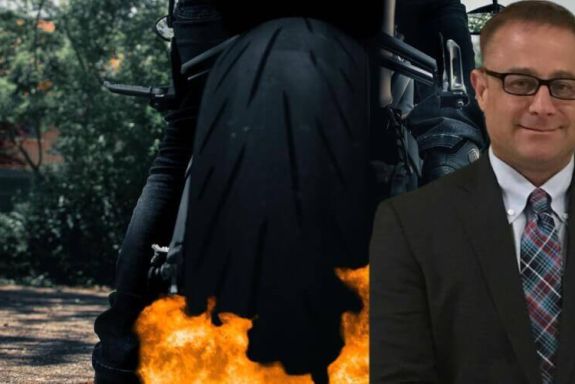

If we don’t win, you don’t pay.
NO WIN – NO FEE

ON CALL 24/7

U.S. Marine

Were you aware that cold weather affects tire pressure significantly? Motorcyclists must take proper safety precautions, such as checking their tire pressures before getting on the road. Changes in motorcycle tire pressure can lead to an imbalance affecting the handling of the motorcycle, which can increase the risk of motorcycle accidents.
Our motorcycle accident attorneys at Ehline Law represent injured motorcycle riders across California. We remain committed to keeping the roads safe for motorcyclists and educating riders about the perils of driving with cold tires.
Impact of Cold Weather on Motorcycle Tires
A drop in the temperature by 10°C drastically impacts the motorcycle tires by reducing the tire pressure between 0.07 and 0.14 bars. Also, if you’re residing in a highly elevated area or traveling to one, tire pressures are further reduced depending on the altitude.
Therefore, for optimum handling, motorcycle riders must check their tire pressures and maintain them at the required level. Underinflated tires lead to reduced motorcycle load capacity, stubborn steering, internal tire damage, and sluggish handling, which can increase accident risks.
With a heightened level of risk, it is crucial for motorcyclists to conduct tire safety inspections, including checking the tire pressures, especially if the tires have gone cold, and checking for signs of wear and tear. Maintaining optimum tire pressure ensures not only grip and traction on surfaces but also fuel efficiency, as it provides more mileage since there is less resistance. It’s even good for the environment, as there are fewer CO2 emissions.
Impact of Cold Tires on Icy Roads
Riding a motorcycle is a whole lot of fun and excitement. Still, as a motorcycle owner, you should be aware of the proper maintenance procedures and safety checks before riding one. According to the Department of Transportation, 70% of the country’s population lives in colder regions where there are snowfalls and icy roads.
Cold tires cause loss of pressure in the tires, leading to underinflated tires, which many believe are great for driving on icy roads since they provide a lot of friction. Although that may be true, once the local governments plow the road to clear out the ice, too much friction can cause your motorcycle to lose control.
More than 1,300 people die annually due to freezing and slippery roads. Some of these accidents are easily preventable by ensuring the manufacturer’s recommended tire pressure and specifications.
Inexperienced Riders Can Cause Cold Tire Motorcycle Accidents
When it comes to driving, experienced drivers are good at defensive driving and can assess a dangerous situation to avoid any accidents. However, inexperienced riders do not have the sort of skill to evade any immediate threats that may come their way. Pair their inexperience with cold tires, and you’ve got yourself a lethal combination.
An inexperienced rider riding a motorcycle with cold tires can cause the vehicle to tip over by braking or overusing the throttle. Poor road conditions also pose the threat of an accident involving inexperienced riders and cold motorcycle tires. Inexperienced riders do not exercise the same level of caution while driving on the road and are susceptible to potholes, cracks, and sand. Even if they see these obstacles, braking with cold tires can cause motorcycles to slip as they do not grip the road well.
Another common trait among inexperienced riders is throttling before turning corners. Whether they’re afraid of the speed becoming too low or they simply do not realize it, speeding when turning with a cold tire can cause a motorcycle to slip and lead to serious accidents. It is crucial that riders remain extremely careful until the motorcycle’s wheels warm up.
Cold Tire Motorcycle Accident Injuries
Depending on the impact of a fall or accident, cold tires can cause the following types of motorcycle accident injuries:
- Head injuries
- Broken bones or fractures
- Road rash
- Muscle damage
- Spinal cord injuries and more.
Unlike motorists, motorcyclists are completely exposed to the asphalt road, and any uncovered body part can receive injuries during an accident. To prevent that, in addition to pre-ride inspections, motorcyclists can wear protective gear such as gloves, leather jackets, boots, and heavy pants to reduce the impact of an accident and protect the exposed parts of their bodies.
Warming up the Tires Before Getting on the Road
The optimal temperature of the motorcycle tire rubber that surfaces the road is about 135°F. Any less than that, and the motorcycle’s handling starts to deteriorate. The best way to warm up your motorcycle tires is to drive slowly for some time. This way, the friction between the cold tires and the road will slowly start warming up the tires, and roads with colder surfaces can take significantly longer for the motorcycle tires to warm up. During this time, motorcyclists must refrain from speeding as it can cause serious accidents.
Some cases in the past suggest that many motorcyclists were unaware that cold tires caused their accidents. They believed that they were casually riding their motorcycles when the accident happened suddenly. Experts recommend driving at around 60 to 70 percent of their normal cruising speed for several minutes to warm the tires before they can drive normally.
How to Check and Adjust Your Tire Pressure?
Motorcycle experts suggest checking your motorcycle’s tire once every two weeks as part of your vehicle’s routine maintenance.
You can check and adjust your tire pressure by following the instructions/tips below:
- To get a more accurate reading, it is crucial that your vehicle tires are cold, so the morning is the best time to get the pressure reading done. You can even check the tire pressure if the motorcycle has not been in use in the past 4 hours.
- The optimum tire pressure varies depending on a motorcycle rider’s vehicle, and you can find it in the vehicle manufacturer’s guidebook.
- When checking the tire pressure, it is crucial that you use a reliable gauge and a good-quality air compressor. You can purchase one online to check the tire pressure at home or head over to the gas station and use one free of charge.
- When you have the gauge in your hand, place it firmly on top of the valve stem and wait until the air stops escaping. You’ll be able to identify that by listening to the hissing sound stop. The gauge will then pick up the pressure and display the reading in PSI or bar. Refer back to the optimum tire pressure for your vehicle. If the reading exceeds the manufacturer’s recommended tire pressure, let some air out by pushing the valve. If it’s lower, fill it up with more air to the recommended level by attaching the gas compressor to the valve.
Determining Liability in an Accident Involving Cold Tires
After reading all that information, one question may be on your mind: who is liable for an accident involving cold tires? Victims are more likely to believe that it is the motorcyclist’s fault since they did not check their tire pressure. However, that is not completely true.
California follows the comparative negligence law, where compensation gets awarded according to the degree of fault. You are most likely liable if you’re speeding with a cold tire and slip, causing injuries to yourself. But, if you’re exercising your duty of care by driving carefully and get into an accident with a negligent driver, then you may be eligible for compensation.
What if you’re speeding with cold tires and crash due to poor road conditions? What if you crash with cold tires due to a manufacturer’s defect, such as a failing brake? These are situations where more than one party is at fault, and in California, after proving the other party’s fault, you can receive a certain amount of compensation.
But, how do you know which party is to blame? Maybe it’s the poor road conditions, the failing brakes, or both. Motorcycle accident lawyers can help identify the negligent party by investigating the accident and recreating the incident. They can not only identify but also pursue legal action against the negligent party to recover the compensation you deserve.
Schedule a Free Consultation with Los Angeles Motorcycle Accident Attorneys
Ehline Law and our attorneys take pride in helping injured victims, and we have achieved superior results by recovering more than $150 million for our clients. Our attorneys are well-versed in comparative law and the California Vehicle Code, allowing us to provide our clients with aggressive legal representation.
The likelihood of a motorcyclist and their passenger receiving serious injuries in an accident is significantly higher than that of occupants in a motor vehicle. At times, you may feel challenged by the claims process while also trying to recover from your injuries but don’t worry. Our attorneys are here to guide you through this dark period 24/7.
Schedule a Free Case Review With Los Angeles Cold Tire Motorcycle Lawyers in Los Angeles
At Ehline Law, we have the resources to investigate your case, gather evidence, and negotiate with the insurers on your behalf. We offer our services on a contingency fee basis, which allows you to receive the best legal representation without worrying about paying upfront legal fees. If you’re looking for a lien doctor to help treat your injuries, our attorneys can help locate a lien doctor where you can receive world-class medical treatment while we take care of your legal troubles.
If you received injuries in a motorcycle accident and require help with the claims, contact us at (213) 596-9642 for a free case review. Our attorneys are there to hear your case and provide you with the legal options you can pursue to pay for the damages. Contact us now for more information or schedule a virtual consultation online.
Resources:
“Motorcycle Industry Council – Tire Guide” https://www.msf-usa.org/downloads/MIC_Tire_Guide_2012V1.pdf
“NHTSA Tire Safety BRO SPREADS”
https://www.nhtsa.gov/DOT/NHTSA/Vehicle%20Safety/Articles/Associated%20Files/brochure.pdf “Gassed it With Cold Tires,”
- Motorcycle Accident
- ATV Accidents
- Common Causes of Motorcycle Wrecks
- Bad Weather Motorcycle Accidents
- Cold Tire Motorcycle Accidents
- DUI Motorcycle Accidents
- Motorcycle Defects
- Motorcycle Head-On Collisions
- Motorcycle Hit And Run Accidents in L.A.
- Motorcycle Lane Splitting Collisions
- Motorcycle Left-Hand Turn Accidents
- Motorcycle Speeding Collisions
- Open Car Door Injuries
- Sudden Stop Motorcycle Collisions
- Teenaged Motorcyclist Accidents
- Two-Wheeled Single Vehicle Collisions
- Common Motorcycle Rider Injuries
- Motorcycle Fracture Injury
- Motorcycle Spinal Cord Injuries
- Motorcycle Wrongful Death
- Motorcycle Accident Government Claims
- Motorcycle Accident Resources
- Motorcycle Accident Statistics
- Motorcycle Accident Terms and Phrases
- Motorcycle Injury Stats
- Motorcycle Passenger Injury

